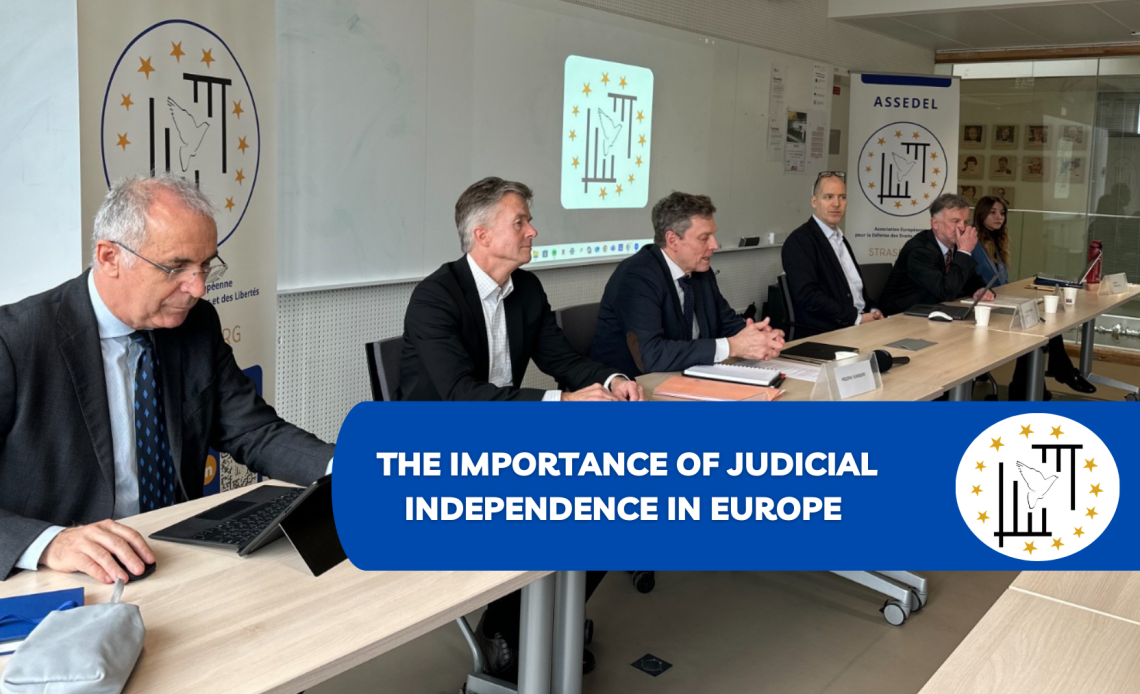On Monday 17th February 2025, ASSEDEL hosted a crucial conference in the Science Po Strasbourg on the state of judicial independence across Europe, featuring distinguished guests such as Ledi Bianku – Former Judge of the European Court of Human Rights, Fredrik Sundberg – Former Chief of the Department for the Execution of the European Court of Human Rights, Dr. Kadar Andras Kristof – Co-chair of the Hungarian Helskinki Committee, Professor Ireneusz C. Kaminski – Institute of Law Studies, Polish Academy of Sciences, Prof Veronika Fikfak – Co-director of the UCL Institute for Human Rights and Dr. Jesper Wittrup – International consultant, Metiri Consult. Leading experts in the fields of law, economics, and human rights gathered to discuss the state of judicial independence in Europe. The discussions centered around two key case studies – Yalçınkaya v. Türkiye and Baka v. Hungary.
The recent high-profile conference has shed critical light on the pressing challenges facing judicial independence in parts of Europe, amid growing concerns over democratic backsliding in the region. Two key case studies – Yalçınkaya v. Türkiye and Baka v. Hungary – have highlighted the ongoing threats to the rule of law and the urgent need for concerted action to protect this fundamental pillar of a healthy democracy.
The Yalçınkaya case exposed the widespread and systematic misuse of anti-terror laws in Türkiye, leading to the arbitrary detention of over 100,000 individuals. This disturbing trend is indicative of the democratic backsliding occurring in the country, where the “winner takes it all” mentality has taken hold, undermining the protection of all parts of society under the rule of law. In its ruling, the European Court of Human Rights found serious violations of the principle of legality, emphasizing the importance of foreseeability and due process in the application of criminal law. This case serves as a stark reminder of how the selective and politicized application of the law can erode the foundations of an independent judiciary.
In the Baka v. Hungary case, the ECtHR delivered a strong rebuke to the Hungarian government’s attempts to stifle judicial freedom of expression as part of its broader efforts to consolidate power and dismantle checks and balances. The court found that the government had used constitutional changes to dismiss an experienced and outspoken judge, András Baka, who had served as the president of Hungary’s National Judicial Council. By removing Baka and replacing him with more pliable appointees, the Hungarian authorities effectively quashed the ability of judges to publicly voice concerns about threats to judicial independence. The ECtHR’s ruling affirmed that judges must be allowed to participate in public debates on legislative reforms affecting the judiciary, as this is not only their right, but also their duty in the face of democratic backsliding.
Experts at the conference warned of the “contagion” effect, where the corrosive practices employed by certain governments to undermine judicial independence can spread to other countries if left unchecked. They emphasized the crucial role of judicial independence in building social trust, which is a key factor in the success of mid-sized companies and the broader economic development of a country. Citing robust empirical evidence, the experts highlighted the strong linkage between the rule of law, including judicial independence, and economic growth, underscoring the high stakes involved in the fight against democratic backsliding.
La protection de l'indépendance judiciaire reste une priorité urgente dans certaines parties de l'Europe, car l'érosion de ce pilier fondamental de la démocratie menace de démanteler les bases mêmes du projet européen. En tant que garants de l'État de droit, nous devons continuer à défendre avec vigilance cet élément essentiel d'une démocratie saine. Seul un engagement continu et inébranlable en faveur de l'indépendance de la justice peut garantir la prospérité et la stabilité continues de nos institutions européennes et protéger les droits et libertés de tous les citoyens.
La conférence a servi d'appel à l'action, soulignant la nécessité d'une vigilance renouvelée et d'une action collective pour lutter contre l'érosion de l'indépendance judiciaire dans certains pays européens, face à la montée inquiétante du recul démocratique. En tirant les leçons des affaires Yalçınkaya et Baka, et en renforçant l'importance cruciale d'un pouvoir judiciaire indépendant pour la gouvernance démocratique et le développement économique, nous pouvons œuvrer au renforcement de la résilience de nos systèmes judiciaires et à la protection des valeurs fondamentales qui sous-tendent le projet européen.
Pour lire le contenu du matériel présenté par András Kádár: Judicial independence and freedom of judicial expression in illiberal systems – the Hungarian examplecliquez ici..
Sur le thème Judicial Independence and Economic Growth, Games, History and Empirical Evidenceprésenté par Jesper Wittrup, cliquez ici..
Pour lire la transcription complète de la conférence sur L'Importance de l'Indépendance Judiciaire en Europe à la lumière de deux études de cas : Yalcinkaya c. Turquie et Baka c. Hongrie, tenue le 17 février 2025 à Strasbourg, cliquez ici..



